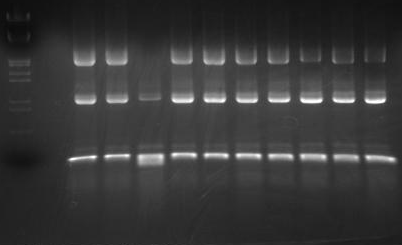Team:HokkaidoU Japan/Notebook/September15
From 2010.igem.org
(Difference between revisions)
(→Result of yesterdays transformation) |
(→Result of yesterdays transformation) |
||
| Line 21: | Line 21: | ||
We used DNA marker [https://2010.igem.org/Image:HokkaidoU_Pictures_DNA_Marker.png Lamda/(Hindi3, EcoR1)] followings are empty lane and then colonies 1 through 10 accordingly. We used 1.5% agarose gel for electrophoresis. | We used DNA marker [https://2010.igem.org/Image:HokkaidoU_Pictures_DNA_Marker.png Lamda/(Hindi3, EcoR1)] followings are empty lane and then colonies 1 through 10 accordingly. We used 1.5% agarose gel for electrophoresis. | ||
| + | |||
| + | | ||
| + | |||
| + | Unfortunately electroporation transformation failed to produce colonies. This was due to fact that competent cells weren't prepared for electroporation (we used cells prepared for heat shock transformation). | ||
Revision as of 13:20, 15 September 2010
- Observed results of yesterdays transformation
- Transformation using heat shock went well
- Electroporation transformation failed produce colonies
- Did Colony PCR of yesterdays transformed colonies
- Introduced colonies to L(+)Arabinose medium to check if it would show desired function
- Check for results tomorrow
Result of yesterdays transformation
Transformation using heat shock went well and produced about 100 colonies. We chose 10 and did colony PCR to check if insert was correct. The insert was Arabinose promoter(BBa_I0500) and GFP reporter(BBa_E0840). Vector used was pSB1C3.
Combined length of insert with prefix, suffix and scar is estimated to be 2143bp. From electrophoresis picture under UV light you can see all colonies except colony-3 have bands at approximate 2000bp position.
We used DNA marker Lamda/(Hindi3, EcoR1) followings are empty lane and then colonies 1 through 10 accordingly. We used 1.5% agarose gel for electrophoresis.
Unfortunately electroporation transformation failed to produce colonies. This was due to fact that competent cells weren't prepared for electroporation (we used cells prepared for heat shock transformation).
 "
"






